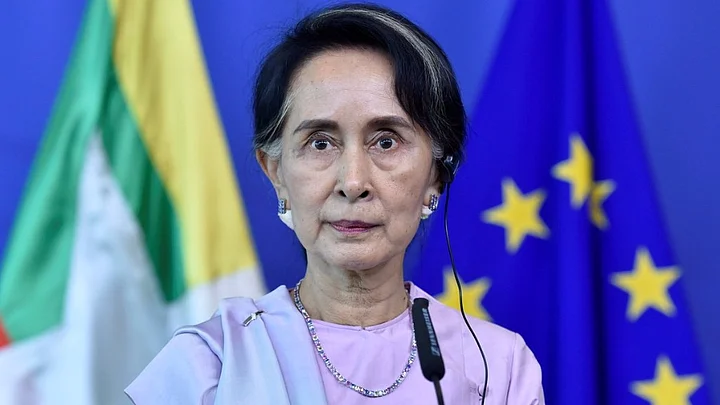Myanmar's de facto leader, Aung San Suu Kyi, on Thursday urged people "not to quarrel" as she visited Rakhine State for the first time since a military crackdown, that drove more than 6,00,000 Rohingya Muslims to flee the country.
Suu Kyi, a Nobel Peace Prize winner, has faced heavy international criticism for not taking a higher profile in responding to what UN officials have called “ethnic cleansing” by the army.
Myanmar has rejected the accusations of ethnic cleansing, saying its security forces launched a counter-insurgency operation after Rohingya militants attacked 30 security posts in northern Rakhine on 25 August.
On Thursday, amid heightened security, Suu Kyi boarded a military helicopter at Sittwe, the capital of Rakhine State, to be taken to Maungdaw, one of districts worst hit by the violence.
Suu Kyi met a group of Muslim religious leaders, said Chris Lewa, of the Arakan Project monitoring group, citing Rohingya sources.
“She only said three things to the people – they should live peacefully, the government is there to help them, and they should not quarrel among each other,” Lewa said, quoting information from a religious leader who was present.
Rohingya began fleeing predominantly Buddhist Myanmar for neighbouring Bangladesh in late August, to escape violence in the wake of a military counter-insurgency operation launched after Rohingya militants attacked security posts in Rakhine State.
On Wednesday, Reuters photographers saw thousands of desperate Rohingya wade through shallows and narrow creeks between islands of the Naf river to reach neighbouring Bangladesh as the exodus that begun two months ago was far from over.
Some had small boats or pulled makeshift rafts to get to Bangladesh on the river's western bank, but most walked, children cradled in their arms and the elderly carried on their backs, with sacks of belongings tied to staves on their shoulders.
Reaching the far side, some women and older people had to be pulled through the mud to reach dry land atop steep banks.
More than 4,000 crossed at different points on the river on Wednesday, Major Mohammed Iqbal, a Bangladesh security official in the southern district of Cox's Bazar, told Reuters.
Talks on Repatriation
Suu Kyi had not previously visited Rakhine since assuming power in 2016 following a landslide 2015 election victory. The majority of residents in the northern part of the state, which includes Maungdaw, were Muslims until the recent crisis.
Suu Kyi was accompanied by about 20 people travelling in two military helicopters, including military, police and state officials, a Reuters reporter said.
Businessman Zaw Zaw, formerly sanctioned by the US Treasury for his ties to Myanmar's junta, was also with the Nobel laureate.
Suu Kyi, who does not control the military, has lately appeared to take a stronger lead in the crisis, focusing government efforts on rehabilitation and pledging to repatriate refugees. She launched a project last month to help rehabilitation and resettlement in Rakhine and has urged tycoons to contribute.
(This was published in arrangement with Reuters.)
(Breathe In, Breathe Out: Are you finding it tough to breathe polluted air? Join hands with FIT to find #PollutionKaSolution. Send in your suggestions to fit@thequint.com or WhatsApp @ +919999008335)
(At The Quint, we question everything. Play an active role in shaping our journalism by becoming a member today.)
